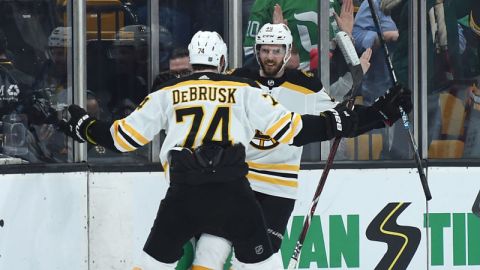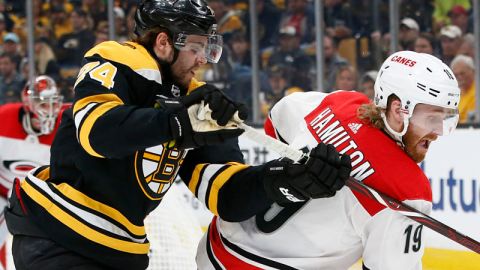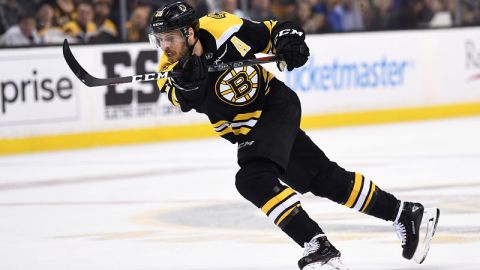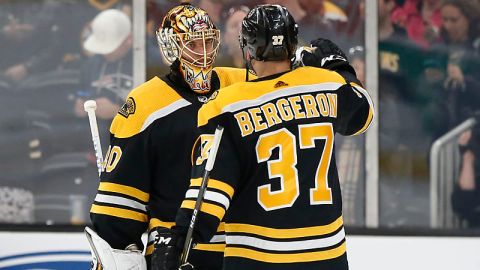The NBA Finals begin Thursday night when LeBron James and the Cleveland Cavaliers take on league MVP Steph Curry and the Golden State Warriors. The other 28 teams will be watching, trying to figure out how they can get there.
That quest begins now, as the next two weeks will include more scouting and preparation for the NBA Draft on Thursday, June 25.
Here’s the second edition of NESN.com’s 2015 NBA mock draft.
1) Minnesota Timberwolves: Karl-Anthony Towns, Kentucky (C, 7-0, 250)
The T-Wolves have a pretty good center in Nikola Pekovic, but he’s nowhere near the rim protector that Towns is, nor does he have the athleticism and length to be a great low-post defender.
Towns isn’t as NBA-ready as Okafor, but Minnesota has the luxury of not needing to contend next season. Towns’ versatility would give the Timberwolves a lot of matchup freedom at both ends of the floor, which is becoming increasingly important in today’s NBA.
2) Los Angles Lakers: Jahlil Okafor, Duke (C, 6-11, 270)
The Lakers didn’t win the lottery, but they jumped ahead of the Knicks and 76ers to No. 2, which allows them to draft one of the top two centers.
The Lakers, throughout their history, have been led by dominant centers such as George Mikan, Wilt Chamberlain, Kareem Abdul-Jabbar and Shaquille O’Neal. While it’s unfair to expect Okafor to join that group, his low-post offense, in addition to his rebounding and maturity, make him an excellent fit for the Lakers.
3) Philadelphia 76ers: Emmanuel Mudiay, Congo (PG, 6-5, 190)
Most of the league’s teams have above-average to very good point guards, and that’s one position the 76ers need to improve. Mudiay decided not to play college basketball and instead signed a pro contract in China for the 2014-15 season. Injuries prevented him from playing a full campaign, but it would be hard for Philly to pass on a point guard his size and playmaking skills.
4) New York Knicks: D’Angelo Russell, Ohio State (PG/SG, 6-5, 180)
The Knicks were the losers of the lottery and won’t have a chance to draft one of the top two center prospects. The best player available should be Russell, who would give the Knicks a combo guard capable of scoring and creating open shots for teammates. His size also would be an asset at the point.
5) Orlando Magic: Justise Winslow, Duke (SG/SF, 6-6, 229)
Winslow has the potential to be an excellent wing player and is able to defend multiple positions with his athleticism and size. He’s not yet a polished offensive player, but his scoring ability should rapidly improve with pro experience.
6) Sacramento Kings: Willie Cauley-Stein, Kentucky (C, 7-0, 240)
Cauley-Stein isn’t as NBA-ready as Towns or Okafor, but he has loads of potential with his size, athleticism and ability to finish at the rim. The Kings already have an All-Star caliber center in DeMarcus Cousins, but they should take the best player available approach if the Kentucky big man is still on the board at No. 6.
7) Denver Nuggets: Trey Lyles, Kentucky (PF, 6-10, 250)
Lyles would provide Denver with some much-needed low-post scoring and improve a frontcourt that finished sixth in rebounds per game last season.
8) Detroit Pistons: Kristaps Porzingis, Latvia (PF, 7-1, 220)
A power forward with size who could stretch the floor would be a nice addition to the Pistons offense. Veteran head coach Stan Van Gundy isn’t afraid to use those types of players (see Rashard Lewis in Orlando).
9) Charlotte Hornets: Mario Hezonja, Croatia (SG/SF, 6-8, 215)
Hezonja’s athleticism and outside shooting would be a nice fit for a Hornets team that likes to push the pace in transition and stretch the floor.
10) Miami Heat: Stanley Johnson, Arizona (SF, 6-7, 240)
The Heat could compete in the East next season depending on Dwyane Wade’s health and what happens in free agency. Right now, they lack athleticism and defense on the wing, and Johnson could address both of those issues with his size and quickness.
11) Indiana Pacers: Sam Dekker, Wisconsin (SF, 6-9, 230)
The Pacers finished 24th in scoring last season and Dekker would provide instant offense off the bench, as well as a suitable substitute for Paul George, who will be returning from a gruesome leg injury.
12) Utah Jazz: Myles Turner, Texas (PF/C, 6-11, 243)
The Jazz have a lot of young guards and small forwards, while Derrick Favors and Rudy Gobert provide strong interior defense and rim protection, Utah lacks depth up front. Turner is a double-double threat with his rebounding ability and scoring from the low post. He’s one of the most NBA-ready big men in this class.
13) Phoenix Suns: Devon Booker, Kentucky (SG, 6-6, 205)
The Suns ranked in the bottom half of the league in 3-point percentage and Booker’s best asset is his ability to consistently knock down outside shots. He also has an improving mid-range game and enough size and strength to defend well as a rookie.
14) Oklahoma City Thunder: Cameron Payne, Murray State (PG, 6-3, 185)
OKC has reportedly promised Payne they will draft him if he’s available. Drafting a point guard makes sense for the Thunder, given their lack of depth behind Russell Westbrook.
15) Atlanta Hawks (via Brooklyn): Rondae Hollis-Jefferson, Arizona (SF, 6-7, 215)
An athletic wing player who rebounds well is just what Atlanta needs after being swept by the Cleveland Cavaliers in the Eastern Conference Finals.
16) Boston Celtics: Bobby Portis, Arkansas (PF, 6-10, 240)
Portis has good size, defends well and is one of the better rebounding power forwards available. He would be a nice replacement for Brandon Bass if the veteran forward leaves Boston as a free agent.
17) Milwaukee Bucks: Frank Kaminsky, Wisconsin (C, 7-0, 240)
The Bucks finished 24th in rebounds per game this season and their centers are John Henson, Zaza Pachulia and Miles Plumlee. Kaminsky would add more grit and low-post scoring to that group.
18) Houston Rockets (via New Orleans): Kelly Oubre, Kansas (SF, 6-7, 200)
A small forward with size, length and a consistent outside shot would add solid depth to the Rockets bench.
19) Washington Wizards: Justin Anderson, Virginia (SG/SF, 6-6, 225)
Anderson can defend multiple positions with his size and quickness, and he spreads the floor with a good 3-point shot. He would be a nice replacement for Paul Pierce at small forward when the veteran forward retires/leaves the team.
20) Toronto Raptors: Jerian Grant, Notre Dame (PG/SG, 6-5, 205)
The Raptors finished 20th in assists last season and lack size at both guard positions, specifically at point guard. Grant would address each concern.
21) Dallas Mavericks: Tyus Jones, Duke (PG, 6-1, 190)
In the likely event Rajon Rondo leaves Dallas as a free agent, the Mavs won’t have a pass-first point guard on their roster. Jones is a quality playmaker with an improving outside shot. He’d also be able to learn the position and not have too much responsibility as a rookie with a veterans such as Raymond Felton or Devin Harris ahead of him on the depth chart.
22) Chicago Bulls: Delon Wright, Utah (PG/SG, 6-5, 190)
Derrick Rose’s health always will be a concern and Aaron Brooks could depart from Chicago this summer. Therefore, drafting a combo guard who can provide defense and impressive instincts off the bench makes sense for the Bulls in Round 1.
23) Portland Trail Blazers: Chris McCullough, Syracuse (PF, 6-10, 220)
McCullough’s rebounding and athleticism would upgrade the talent and depth at power forward for Portland, who need to improve their frontcourt depth regardless of whether All-Star LaMarcus Aldridge leaves as a free agent.
24) Cleveland Cavaliers: Montrezl Harrell, Louisville (PF, 6-8, 240)
The Cavaliers already are a good rebounding team, but if they lose Kevin Love in free agency, they will need another body in the frontcourt. Harrell is a very good rebounder despite his lack of size and length, and he wouldn’t be asked to score a whole lot with LeBron James and Kyrie Irving shouldering that burden.
25) Memphis Grizzlies: R.J. Hunter, Georgia State (SG, 6-5, 185)
Hunter can provide scoring off the bench and defend multiple positions with his size and quickness. Veteran shooting guard Tony Allen is an excellent perimeter defender, but he’s a huge liability on the offensive end of the floor.
26) San Antonio Spurs: Kevon Looney, UCLA (SF/PF, 6-9, 220)
Looney is a double-double threat as a low-post scorer and a consistent rebounder despite his lack of size. His ability to play both forward positions also provides valuable versatility.
27) Los Angeles Lakers: Christian Wood, UNLV (PF, 6-11, 220)
An athletic power forward who can penetrate defenses from the perimeter and rebound on the defensive glass is a good target for any team at the bottom of the first round.
28) Boston Celtics (via Atlanta): Olivier Hanlan, Boston College (PG/SG, 6-4, 190)
Hanlan might be a reach at this point in the draft, but the Celtics need shooting and versatility and the BC guard brings both to the table. He averaged more than 19 points per game, and shot 45 percent from the field and 35 percent from 3-point range in his junior season with the Eagles.
29) Brooklyn Nets (via Atlanta): Terry Rozier, Louisville (PG, 6-2, 190)
Veteran point guard Deron Williams eventually will need to be replaced and Rozier is a good playmaker with a high basketball IQ.
30) Golden State Warriors: Dakari Johnson, Kentucky (C, 7-0, 244)
Veteran power forward David Lee hasn’t made the kind of impact many would have hoped for and he has just one more year left on his contract. It would be wise for the Warriors to add some size, rim protection and rebounding to their lineup. Johnson has a lot of room for improvement offensively, but his low-post defense and rebounding are NBA-caliber.
Thumbnail photo via Bob Donnan/USA TODAY Sports Images



